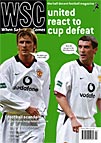 Today, Chile; tomorrow, the world. Dave Hannigan reports on the roundabout route but boundless ambitions of the Palestinian Authority's national side
Today, Chile; tomorrow, the world. Dave Hannigan reports on the roundabout route but boundless ambitions of the Palestinian Authority's national side
Counting down towards the start of the qualifying campaign for next year’s Asian Cup in China, Palestine are hopeful that an influx of some South American flair via the parentage rule will yield success on the field and positive publicity off it.
No sooner had FIFA ended Palestine’s half a century in the international wilderness by inviting it to re-affiliate in 1998 than the state’s football federation made a decision which showed they still knew how sport works at the highest level. Putting a side together which finished a highly creditable third at the 1999 Pan Arab Games was the first priority, but the second, more prescient move was employing somebody to scour South America in search of talented players eligible to wear the hardly familiar, red, white, green and black jersey of Palestine. What better way to promote the cause of the PLO than via football?
Following in the footsteps of a succession of Republic of Ireland managers, Nicola Hadwa, Palestine’s roving football ambassador, started scanning team-sheets from all over the continent in search of Arabic names and potential recruits. He began the quest in his native Chile, a country boasting the largest community of Palestinians outside the Middle East and Deportivo Palestino, a Premier Division club founded 82 years ago by newly arrived immigrants in Santiago. Like around 350,000 of his compatriots, Hadwa’s own links to the beleaguered homeland are strong – both his parents were born in a village near Bethlehem.
Once he became national coach last year, Hadwa organised for the 20 best Palestine-based players to relocate to Chile for a training camp. Given the difficulties in training amid the violence back home, it was a logical step to take. They got to meet and mix with the new recruits in a peaceful atmosphere, while the publicity yielded an unexpected reward.
“My uncle was watching al-Jazeera on his satellite TV and he saw something on the team,” said Shaker Asad, a 23-year-old midfielder with the New England Revolution whose parents swapped Gaza for North Carolina when he was five. “He said: ‘They’re going to Chile, why don’t you?’ This makes you think about more than just soccer. My mom’s family still live in Gaza. You talk to them on the phone and you can hear gunfire outside. I feel, with all the stuff that’s going on, there’s nothing better than wearing the uniform of your country.”
Asad made his competitive bow for his homeland at December’s Arab Cup in Kuwait, a tournament where Palestine finished bottom of Group B below Jordan, Morocco, Kuwait and Sudan. They did draw three of their four games, however, and Hadwa got to blood several of the new players. Argentina-born midfielder Pablo Abdala, a star with top Chilean club Cobreloa, and Roberto Kettlun, a Deportivo Palestino striker, were among those who also figured. The beauty of the whole initiative is that these professionals were lining up alongside veteran internationals like Jamal al-Houli, a midfielder-cum-policeman who’s been living in the Rafah refugee camp since his family home was destroyed by the Israeli army last August.
“We want to raise the level of competitiveness in Palestine and we are convinced we will find the necessary players in Latin America to strengthen the team,” said Hadwa in an interview last year. “I want to build a competitive and committed side, able to properly defend the colours of Palestine. The medium-term objective is to qualify for the World Cup in Germany in 2006 and become the world champions. There wouldn’t be much point taking up this gauntlet without having ambitious objectives.”
What else would you expect the manager of the side ranked 143rd in the FIFA world rankings to say?
From WSC 194 April 2003. What was happening this month